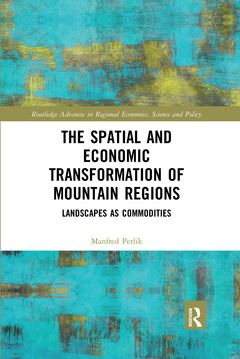Description
The Spatial and Economic Transformation of Mountain Regions
Landscapes as Commodities
Routledge Advances in Regional Economics, Science and Policy Series
Author: Perlik Manfred
Language: English
Subjects for The Spatial and Economic Transformation of Mountain Regions:
Keywords
Resort Towns; Bourdieu’s Social Fields; RSA; La Chaux De Fonds; Mountain Regions; Nord Pas De Calais; Economic Development; Vice Versa; Alps; Pennine Alps; Tourism; Lesotho Highlands Water Project; Recreation; Socio-economic Development; Regional Development; European Alps; Regional Science; Business Services Industries; Regional Studies; Piper; Sally Hardy; Alpine Arc; Spatial Economics; Fordist Crisis; The City; Follow; Urban Studies; Chaux De Fonds; Residential Economies; Fordist Period; Mountain Population; Uneven Spatial Development; Mountain Economies; Mountain Territories; Mountain Areas; HKH Region; Urban Middle Class Milieu
Publication date: 09-2020
· 15.6x23.4 cm · Paperback
Publication date: 01-2019
· 15.6x23.4 cm · Hardback
Description
/li>Contents
/li>Readership
/li>Biography
/li>
Mountain regions are subject to a unique set of economic pressures: they act as collective enterprises which have to valorize rare resources, such as spectacular landscapes. While primarily rural in nature, they often border large cities, and the development of industries such as hydroelectric power and the rapid development of tourism can bring about sweeping socio-economic change and vast demographic alterations.
The Spatial and Economic Transformation of Mountain Regions describes the socio-economic changes and spatial impacts of the last four decades, with the transformation of mountain areas held up as an example. Much of the real-world context draws on the Alps, spanning as they do the significant economies of France, Italy, Germany, Switzerland, and Austria. Chapters address academic discourse on regional development in these mountain areas and suggest alternative approaches to the liberal-productivist societal model.
This book will be essential reading for professionals, institutions, and NGOs searching for counter-models to the existing marketing approaches for peripheral areas. It will also be of interest to students of regional development, economic geography, environmental studies, and industrial economics.
List of Figure. List of Tables. List of Plates. List of abbreviations. Preface. Part I: Space, environment, and culture as a social question. 1 Why study mountains? Mountains as a laboratory and pertinent indicator. 2 The theoretical approach to mountain research from the socio-economic point of view. 3 The issue of spatial inequality in a new light. Part II: Devaluation and revaluation of territorial capital in mountain areas. 4 Spatial and socio-economic processes in mountains. 5 The new role of mountains as global suppliers. Part III: A new level of inequality. 6 The shift from state-organized to liberal-productivist regimes. 7 The new spatial disparities. Part IV: The new disparities and possible alternatives. 8 Liberal-productivist mountains: three main aspects. 9 Three possible trajectories for mountain regions. 10 Beyond liberal-productivism. Bibliography. Index
Manfred Perlik is a Professor at the Centre for Development and Environment at the University of Bern, Switzerland. He is also affiliated with Laboratoire Pacte, Unité Mixte de Recherche (UMR), at the Université Grenoble Alpes, France. As an economic geographer, his focus is on urbanization in mountain areas and his recent research deals with questions of spatial justice, transformative social innovation, and new migration – chosen or forced – into mountain areas.

